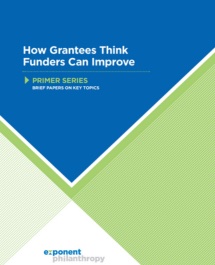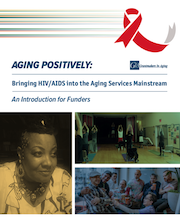Site Search
- resource provided by the Forum Network Knowledgebase.
Search Tip: Search with " " to find exact matches.
This toolkit includes a number of tools for Steering Committee Working Groups as they form, determine strategic direction, develop implementation plans, and identify measurement indicators. This toolkit includes a description of working group member responsibilities, an action planning template, and sample instructions for the development of indicators. The tools have been generalized to be applicable across contexts; however, because no two collective impact efforts are the same, these resources should be considered a starting place to be tailored to the unique circumstances of each initiative.
In this new monograph, Philanthropy Northwest board member Daniel Kemmis explores the sometimes-fraught relationship between philanthropy and democracy. Beginning with a wide-ranging stroll through the shared history of philanthropy and democracy, Kemmis examines the current post-Citizens United landscape and asks whether philanthropy can and should do more to strengthen the infrastructure and practices of democracy.
The Associate, Program and Operations will serve as a key member of a small, cohesive team that advances the Foundation’s mission to close the racial wealth gap in New Jersey. The Associate is responsible for providing support to the Program team and other staff in the areas of Foundation strategy, administration, and operations. Duties can range broadly but would include researching and drafting materials, events planning and management, supporting office operations, supporting stakeholder engagement, and scheduling, among other things

Funders want to be the best versions of themselves. A critical step on that journey is getting feedback from grantees. However, not every foundation has the time or capacity to collect grantee feedback.
Exponent Philanthropy helps lean funders collect feedback from their communities through the Grantee and Applicant Perception Survey. Over the past 2 years, they’ve worked with six foundations to survey more than 400 nonprofits to learn what lean funders do well and where they can improve..
In this publication, they’ve compiled feedback from those surveys to try and help lean funders understand what nonprofits want them to learn. We’ve organized that feedback into two main sections:.
1. How nonprofits think funders should increase their impact
2. How nonprofits think funders should improve their processes.
Throughout this publication, you’ll find data from our surveys and direct quotes from nonprofit leaders. We provide additional context and data from the 2023 Foundation Operations and Management Report (FOMR) and links to additional resources to learn more about these topics.

For decades, aging and HIV/AIDS and their medical, governmental, community, and philanthropic structures and services were worlds apart. This made sense at first, when the majority of the first generation of people affected by HIV were young gay men, many of whom got their care in HIV-specific or infectious disease settings. The odds of living a long life with HIV/AIDS were small, and even survivors did not seek traditional aging services.
Those circumstances have now changed. Thanks to advances in treatment, the ability to live for decades with HIV has become a remarkable success story. Add to this the reality of older people who are acquiring the infection in their 50s or 60s, and HIV/AIDS must now be included as an aging issue. Of the 1.1 million people in the United States who are living with HIV/AIDS, half are 50 or older (50+). By 2030, it is anticipated that three out of four people who are living with HIV will be 50+.
The whole-person outlook and community-based approach of aging services has the potential to bring comfort to this resilient but overlooked group of people. This report will raise the voices and examine the needs of older people living with HIV, while exploring opportunities for philanthropies to create meaningful impact in public and personal health and wellbeing.
A year after kicking off an initiative to improve nutrition at schools in its hometown of Camden, Campbell Soup Co. is getting high marks. And over the next five years, the soup and snack giant plans to invest $5 million in Full Futures, a sweeping effort to make sure students are well nourished and ready to thrive — both in the classroom and outside of it.
Armed with research linking school meals and healthy diets to academic success, Campbell executives saw an opportunity to effect change by leveraging the expertise and resources of numerous partners to advance developments in nutrition programming and cafeteria infrastructure across a school district that serves 11,000 students.
Working in partnership with the Camden City School District, as well as several nonprofit and corporate entities, Campbell set out to improve how kids eat at school through cafeteria equipment upgrades, expanded meal programs, nutrition education, reformulated menus and equitable sourcing of local, fresh produce.
Campbell recently reported on its progress with Full Futures, as well as next steps planned to keep the momentum going during the next four years of the campaign.
